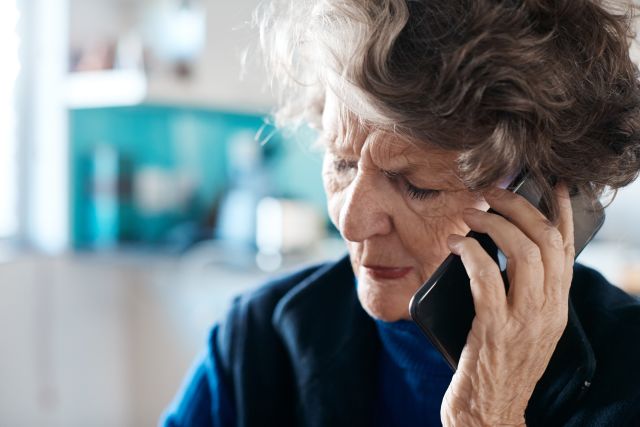Updated on May 1, 2020.
It’s sad, but true: Whenever catastrophe strikes, scammers are close behind, exploiting people who are scared, in need of help or looking for ways to pitch in. From 9/11 to Hurricane Katrina, Americans have lost billions to these con artists, and their tricks have only grown more sophisticated over the years.
The COVID-19 pandemic presents yet another opportunity for scammers to steal personal information and money, especially now that federal stimulus payments are going out. But the situation is different this time around—and not in a good way.
“Normally a disaster like an earthquake, fire, tsunami, famine or war is occurring in a specific geographic area or is affecting a specific community or group of people,” says Laurie Styron, Executive Director of nonprofit charity watchdog CharityWatch. “The roles of donor and victim are clearly delineated.”
But unlike other crises, she explains, the pandemic is a global tragedy. “It threatens health and life indiscriminately, and the associated economic fallout is the worst we have experienced since the Great Depression,” she says. “We are all victims to at least some extent.”
This means every one of us, all over the world, is vulnerable to being scammed. In the United States alone, between January 1 and April 27, more than 27,000 complaints related to COVID-19 were reported to the Federal Trade Commission (FTC), with losses totaling more than $20 million.
So, what scams should you look out for? What can you do if you think you’ve encountered one? And how can you donate safely to people in need?
Scams in the time of COVID-19
While lots of common, time-tested schemes have continued unabated during the pandemic, many crooks are altering their messages to take advantage of disease fears.
“So far, most of the scams reported by the FTC have been related to fraudsters claiming to have personal protective equipment for sale at a high price,” says Styron. Scammers are also selling medical supplies, treatments and tests claiming to detect, relieve or even cure COVID-19. In many cases, they’re marketed through emails or legitimate-looking websites. Some are pushing investment opportunities for these products, too, claiming stocks could increase exponentially if the item ends up working.
Another common COVID-19 scam: Someone impersonating a government official—perhaps from Medicare, the Internal Revenue Service (IRS) or the Social Security Administration (SSA)—reaches out with a fake offer for stimulus relief or a request for a donation. Styron says scammers may hunt for bank or personal information “by claiming that their target victim is eligible for Medicare or other COVID-19 government benefits.”
One newer scam, a message claiming to be from the Centers for Disease Control and Prevention (CDC), even tells you that you’ve come into contact with an infected person and gives you a link to a sham website.
Who’s at risk for scams?
Elderly people are popular targets for these criminals. “Many have significant investments, cash savings and other assets as compared to younger generations,” says Styron. “And depending on their age, their mental acuity may be in decline.” Plus, many seniors are deferential to authority, she explains, which can make them more vulnerable to being exploited.
Everyone is susceptible, however—even 20- and 30-somethings. “Increasingly, younger generations are scammed on social media platforms by giving impulsively without researching first to understand if the charity asking for funds is legitimate or operates efficiently,” Styron says.
And this is just the beginning. “We probably won't find out about charity scams for a few months,” she explains, “until after the dust has settled and donors start wondering exactly how their donations were used.”
What to do if you suspect a scam
So, what if you’re targeted by a scammer? How can you identify a scam, and what should you do next?
“The best way to avoid an outright scammer is to never give on the spot under pressure,” says Styron. Scammers will often use sob stories to pressure you for donations, and rushed, in-the-moment giving decisions can lead to wasted money.
“People may never find out that their donation was not used as advertised or was given to a nonexistent charity,” she explains.
In general, you shouldn’t donate money to any person or organization you don’t know—especially if they reach out to you first. Never give your personal or financial information, either, including your address, birthdate, Social Security number, bank account data or credit card number.
Understand that federal agencies—including the CDC, IRS, SSA and Medicare—do not ask for donations from the public. They will not contact you about stimulus payments unsolicited, either. Ignore communication that says you have to “sign up” or give additional personal information to receive your check.
Scammers may try different tactics, too, depending on the way they reach out to you. So, make sure you take these precautions:
Phone calls. Avoid answering calls from unfamiliar or suspicious numbers. If you do answer and it’s a robocall, hang up. Don’t hesitate, and don’t press any requested numbers. Just ditch the call.
What if a real person representing an unfamiliar organization calls you? Whether they claim to be fundraising for a COVID-19 charity or ask you to invest in pharmaceutical stocks, ignore any requests to give money on the spot. If you’re interested in learning more, take their information and do a little research online (more on that below). You can always donate later if the organization turns out to be legitimate.
Texts and emails. Don’t open or respond to messages from an unknown person or organization—and avoid clicking on links and attachments. If a random text asks you to reply “STOP” to prevent future messages, skip it; crooks often use this method to pinpoint active phone numbers. Be especially careful about any message claiming to offer a cure for COVID-19. It does not exist.
Google has been blocking more than 250 million COVID-19 spam emails per day, according to an April 16 report, with many disguised as messages from government agencies or employers. If you receive a suspicious email, watch for grammar and spelling errors, a generic greeting or a strange sender email address; all are signs of a scam. Delete emails that request your personal information or insist you act right now. To be safe, make sure the anti-malware programs on your computer are updated, too.
Mail. Millions of Americans are expecting to receive federal stimulus payments in the mail. If you’re among them, beware of being overpaid or getting a physical check when you anticipated a direct deposit. Both can indicate a con, as can the use of the phrases “stimulus check” or “stimulus payment” in written communication—the official government term is “economic impact payment.” Call the IRS before taking action to cash a suspicious payment, and don’t repay any excess, especially if you’re asked to do so with cash, gift cards or a wire transfer.
How to donate to charity without getting scammed
So, how can you give to pandemic efforts without putting your money and personal information at risk?
Styron suggests first seeking charities that are important to you, then researching how they use the money “and donating generously if you can.” While any donation will be appreciated, your cash will go further if you give a larger amount to a single, efficient nonprofit rather than make smaller donations to lots of different charities—which can cause more of your money to be lost to overhead costs.
During your research, check out watchdog websites, like Charity Navigator or CharityWatch, for nonprofits with good reviews. You may want to focus on food bank organizations like Feeding America, Meals on Wheels and World Central Kitchen, which are in dire need of funds during the pandemic.
Beware of charities with copycat names, or names that sound very similar to renowned nonprofits. Scammers often use soundalikes to confuse consumers. In one 2015 case, state attorney generals and the Federal Trade Commission sued four legitimate-sounding cancer charities—Cancer Fund of America, Children’s Cancer Fund of America, Cancer Support Services and The Breast Cancer Society—for defrauding people out of $187 million.
If you’d like to donate to a GoFundMe or other individual fundraiser, make sure you can verify the cause is legitimate. In these cases, it may be best to know the affected person or the fundraising party personally. Avoid giving to unknown individuals you see on social media.
When you make a donation, use a check or credit card—never cash, gift cards or a wire transfer, because payments cannot be stopped or traced once they’re initiated. Avoid contributing goods unless a charity specifically asks for them. Though donating gently used clothes, furniture or household items is sometimes helpful during normal times, it can create delays and extra costs for charities during the COVID-19 outbreak.
Finally, if you suspect a scam, report it right away. Reach out to your state attorney general or secretary of state, or file a complaint with the FTC via their official website or by calling 1-877-382-4357. You can also get in touch with a charity watchdog website or the Better Business Bureau to report your experience.
Ultimately, by keeping an eye out and doing a little research, you can keep yourself, your family and your savings safe from scams—and still do your part for those hurting from the pandemic, too.







